| Member Organizations/ Institutions
University of Sydney Centre for the Study of Human Rights, University of Colombo Kathmandu Law School, Nepal |
ORGANIZATION/ INSTITUTION SUBSCRIBER FORMINDIVIDUAL USER SUBSCRIBER FORM |
Individuals
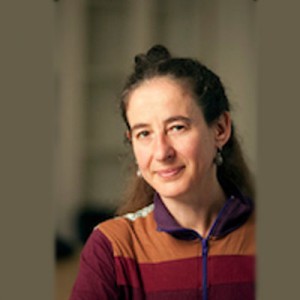
Associate Professor Danielle Celermajer
Associate Professor Danielle Celermajer is the Director of the project. With a background in both activism and academia, this project draws on her dual passions for imaginative and rigorous research and action that makes a difference.
Having spent several years as Director of Indigenous Policy at the Australian Human Rights Commission, Danielle moved to the United States in 1998 to complete her doctoral studies in political theory and international law at Columbia University, where she also taught human rights and ran an international project on religion and human rights. She returned to Australia in 2005 to take up a position in the Department of Sociology and Social Policy at the University of Sydney, where she created the Bachelor of Global Studies, the Masters of Human Rights and won a 1.5 million Euro grant from the European Commission to establish the Masters of Human Rights and Democratization (Asia Pacific program). Through the relationships formed as part of this program with the Centre for the Study of Human Rights at the University of Colombo and the Kathmandu School of Law, she conceived of and developed the Root Causes of Torture Project, subsequently bringing together the core and expert team. She is author of numerous journal articles and book chapters on human rights and political theory as well as two books Sins of the Nation and The Ritual of Apology, published by Cambridge University Press in 2009 and Power, Judgment and Political Evil, Ashgate, 2010.

Georgie Wheadon
Georgie Wheadon is a Project Manager who coordinates the administrative and operational elements of the project. Georgie came to the education sector in 2012 after ten years working on social justice and policy projects in the private, public and not-for-profit sectors. Her previous roles included working as a communications and social policy specialist in a public policy consultancy, the communications coordinator for an independent think tank and the state engagement manager for a national charity.
Georgie holds a Masters in Public Policy from the University of Sydney and a BA Communications and International Studies from UTS and Universidad Autonoma de Barcelona, Spain. She has a keen interest in the intersection of social justice issues, human rights and public administration. Georgie has been a Committee of Management member for independent aid and trade watchdog AID/WATCH since 2013.

Melissa McCullough
Melissa McCullough is the Events Manager for the project. She is a graduate of the Master of Arts in Peace and Conflict Studies at the University of Sydney and has been working in the non-profit and government sector for the past eight years. Melissa’s areas of expertise span project management, social research, policy and advocacy, strategic communications, media and public relations, fundraising, partnership development and stakeholder engagement, major event coordination and non-profit organisational development. Career highlights include as Project Coordinator for the Sydney Peace Foundation, Events Manager for the International Peace Research Association, Corporate Relations Manager for Youth Services and Advocacy and Support (YSAS), as well as various contract roles with state and federal Government.
Melissa currently volunteers with the St Vincent de Paul Night Patrol Programme and is on the board of the United Nations Association of Australia Young Professionals. She is passionate about business and human rights, and in 2015 will commence a research degree in the area of sustainable agriculture and peacebuilding in Southern and East Africa.
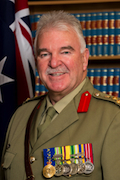
Brigadier Michael Griffin AM
Brigadier Michael (“Mick”) Griffin, now Australian Director of Military Prosecutions is a soldier and a lawyer who has served in the Australian Military for almost 40 years. As part of his distinguished legal career spanning over 25 years, he sat on the Australian Crime Commission, the Veterans’ Review Board, the Administrative Appeals Tribunal, the Migration Review Tribunal and the Refugee Review Tribunal. He has conducted well over a thousand hearings as presiding officer, in both inquisitorial and adversarial legal proceedings, in Australia and overseas and has written hundreds of published decisions in this judicial role. Michael was appointed as Foreign Attorney Consultant to the US Military Commissions at the request of an Australian citizen, Mr. Hicks, and appeared before the Commissions in Washington and Guantanamo Bay from 2005 until Mr. Hick’s release in 2007. He was appointed a Member of the Order of Australia in 2009.
Mick’s role in the project was as principal facilitator of the workshops with the Military and Police in Sri Lanka and Nepal. His standing as a senior member of the Military allowed him to approach this task and gain legitimacy amongst his peers in a uniquely effective and powerful manner.
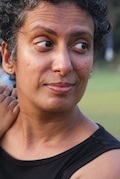
Professor Gameela Samarasinghe
Gameela is a Sri Lankan psychologist with internationally recognized expertise in torture and trauma, bringing to this field a critical understanding of the importance of recognizing cultural and social context in the development of treatment programs. Gameela has been instrumental in developing community based torture an trauma programs in Sri Lanka and has been a member of various advisory groups developing strategies for post-conflict trauma in Sri Lanka and internationally. These include her role as Technical Advisor to the Asia Foundation’s Reducing the Incidence of Torture (RESIST) Program and to the Victims of Torture Treatment Program (VTTP), which are programs designed to support and treat torture survivors. She is a member of the international research team on “Trauma, Peace building and Development”, run from the University of Ulster. She is co-author (with Maleeka Salih) of Transitional Justice in the context of Psychosocial Work in Sri Lanka (SPARC 2006). Gameela is an Associate Professor in the Department of Sociology at the University of Colombo.
Gameela’s distinctive contribution to the project was to examine the root causes of torture against the particular social, cultural, religious, political and historical dynamics of Sri Lanka. She also worked closely with Jack Saul to develop a systems approach for the project.
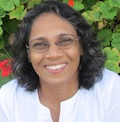
Nilani de Silva
Nilani de Silva is a member of the Sri Lankan team. She is the Project Manager of the Centre for the Study of Human Rights, University of Colombo. Her expertise is in writing project proposals, project reports, resource allocation and budgeting and team management. She has been a Co-ordinator of the EHRP project in Sri Lanka since 2012.
Nilani obtained a Bachelor’s degree in Sociology from the University of New England and a Master’s in Social Planning and Development from the University of Queensland.

Kaushalya Ariyarathne
Kaushalya worked as a Project Coordinator at the Centre for the Study of Human Rights, University of Colombo since 2010.
Kaushalya holds an LL.B from the University of Colombo and a MA from Keele University, United Kingdom. She has experience in research and teaching human rights, especially for the Department of Prisons and Police in Sri Lanka. She is also a trained Lawyer.

Vidura Prabath Munasinghe
Vidura was the Senior Researcher of the EHRP project at CSHR, University of Colombo. He is a trained Lawyer and an activist. He has also worked for many INGOs and NGOs. Vidura was awarded the ‘Religion and Power’ scholarship by Oslo and Akershus University College for Applied Sciences and VLIR-UOS scholarship by the Belgium Federal Government. He is an experienced researcher and a human rights trainer in military and law enforcement institutions. Recently, based on his experience in the EHRP project he developed a Diploma on Human Rights based Policing for CSHR.
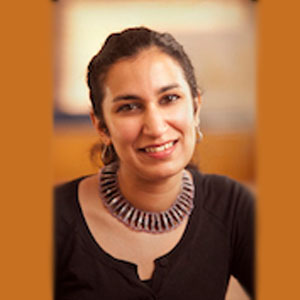
Dr Kiran Grewal
Dr Kiran Grewal is the Research Manager for the project. A trained lawyer, Kiran has worked in private practice, the international justice section of Amnesty International and as a trial monitor at the Special Court for Sierra Leone before joining the University of Sydney as a lecturer in human rights and socio-legal studies. Kiran received her PhD from the University of Technology, Sydney in 2009 on the topic of French and Australian public discourses on sexual violence, ethnic diversity and constructions of the nation. Since then she has published in the areas of international criminal law, sexual violence, transitional justice, nationalism and women’s rights. She has also conducted extensive fieldwork in Kosovo, Sierra Leone, Sri Lanka and Nepal. She is the author of two forthcoming books, The Socio-Political Practice of Human Rightsand Ethnicized Gang Rape and Discourses of Gender, Race and Nation both to be published by Ashgate.
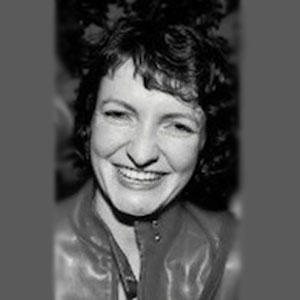
Anna Noonan
Anna Noonan is the Senior Project Manager of the University of Sydney’s human rights programs, which involves managing the daily operations and full implementation of two major grants, the Enhancing Human Rights Protections and Security in the Asia Pacific project and the Asia Pacific Masters of Human Rights and Democratisation and the Global Human Rights Campus. Anna’s role in the Enhancing Human Rights Protections and Security in the Asia Pacific has also included the translation of multidisciplinary research and a theory of change into an Intervention design and the production of associated project management resources, workshops and publications.
Anna has over 12 years experience in developing and managing complex international development and technical assistance projects in human rights, press freedom, public health, Indigenous rights and wellbeing, and sustainable development from local grass-roots organisations and Australia-based NGOs, to industry leaders from across the Asia Pacific region and international organisations including the International Federation of Journalists, Amnesty International and the World Health Organisation.

Paula Gleeson
Paula Gleeson is new to the project and comes to us from Medecins Sans Frontieres Australia. Paula has a public health background and has been living and working in post conflict and resource deprived countries for over 20 years. Most recently Paula came from Cambodia, where she worked and lived, with her family, for five years. Her work has been predominantly with women and children, with a focus on gender, womens rights and sexual and reproductive health. Prior to Cambodia, Paula worked with the World Health Organisation (WHO) in Africa and South East Asia on the Expanded Programme of Immunisation. Paula has a BA Business and a Master of Public Health and has led development and rights based programmes and projects, including operational and participatory research and evaluations, for international NGOs, national NGOs, the United Nations and bilateral organisations.
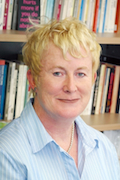
Professor Moira Carmody
As an internationally recognized expert on sexual violence and the development of preventative education, Moira brings to the project a unique understanding of effective prevention strategies, deep and long experience in combining research and the development of interventions and a profound sensitivity to the ethics of research in complex situations. As well as her extensive scholarly research, Moira has provided high-level advice to state and federal governments on strategies to address sexual assault and violence. In 2006 Moira was awarded the Taylor and Francis Distinguished International Research Award for Women’s Health for her work on sexual violence policy and practice. Her publications include Sex & Ethics: young people and ethical sex (Palgrave, 2009). She is a Professor in the School of Social Sciences & Psychology at the University of Western Sydney, Australia.
Moira’s specific role in the project was to advise on strategies and programs for effecting cultural and behavioral change and how these might be usefully adopted to the context of this project.

Dr. Astrid Birgden
Astrid brings a unique background to the project, as a forensic psychologist who, amongst other achievements, established and managed the Compulsory Drug Treatment Correctional Centre in Sydney and led a cultural transformation project towards offender rehabilitation in correctional staff in Victoria. Astrid is currently working as a consultant across Australia and the USA in the areas of offender rehabilitation, therapeutic jurisprudence, police-citizen mediation and human rights and is published in these areas. In addition to being a consultant, Astrid is an Adjunct Clinical Associate Professor at Deakin University.
Astrid’s role in the project was to translate the research into a practical intervention design and to assist in designing the workshops with the police and military.
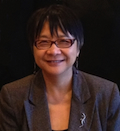
Professor Janet Chan
Janet is an internationally recognized criminologist, best known for her original and influential work on police culture, police training and socialization and police reform. Working at the interface of sociology, criminology and law, Janet has had a tremendous influence on how scholars understand ‘police culture’ and on our understanding of how practices that might be considered aberrant from the outside come to be normalized through the structures and routines of policing institutions. Her publications include (with Devery & Doran) Fair Cop: Learning the Art of Policing, (University of Toronto Press, 2003) and Changing Police Culture: Policing in a Multicultural Society, (Cambridge University Press, 1997). She is a Professor in the Faculty of Law at the University of NSW.
Janet’s specific contribution to the project was to research the institutional and organizational factors within policing and security organizations that contribute to violence becoming systematic and normalized. She also examined strategies adopted by police forces and military organizations to combat institutional violence.

Professor Darius Rejali
Darius’s encyclopedic knowledge of the history and practices of torture, documented most powerfully in his book, Torture and Democracy make him one of the most respected experts on the politics and dynamics of torture in the world. He has spent his scholarly career reflecting on violence, and, specifically, reflecting on the causes, consequences, and meaning of modern torture in our world. His work spans concerns in political science, philosophy, sociology, anthropology, history, and critical social theory. Torture and Democracy (Princeton University Press) won the 2007 Human Rights Book of the Year Award from the American Political Science Association and the Raphael Lemkin Award from the Institute for the Study of Genocide for the best non-fiction work addressing the causes of genocide and crimes against humanity. His scholarly work has now also placed him in the international media spotlight, and positioning him among the world’s most sought after experts, with appearances in news sources that range from Democracy Now! to Al Jazeera and from the BBC to the Washington Post. Darius is a Professor of Political Science at Reed University.
Through a history of conversations with Associate Professor Celermajer, Darius was instrumental in the original conception of the project. During the life of the project, his specific contribution was to conduct an inventory and critical analysis of torture prevention strategies, as well as conceptual analysing of the empirical country based material.

Jack Saul
Jack Saul, Ph.D. is the Director of the International Trauma Studies Program and Assistant Professor of Clinical Population and family health at Columbia University’s Mailman School of Public Health in New York City. As a psychologist he has created a number of programs for populations that have endured war, torture and political violence.
As a resident of downtown New York he helped establish the FEMA funded Post 9/11 Downtown Community Resource Center, which harnessed the capacities of community members to transform traumatic experience into communal recovery. He has written about this work in his recently published book, Collective Trauma, Collective Healing: Promoting Community Resilience in the Aftermath of Disaster. Dr. Saul consults to humanitarian and media organizations on staff welfare in response to trauma and has worked extensively with war reporters and photographers. He has a private practice in Manhattan.
Jack’s distinctive contribution was to research the individual, community and institutional level factors that contribute to systematic violence and the use of torture. He also examined practices and projects designed to reduce systematic violence and torture for any principles and practices that might be drawn from them and worked with Gameela to develop a systems approach for the project.
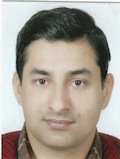
Pradeep Pathak
Pradeep is the Project Coordinator for the Nepal office. His responsibilities include overseeing all aspects of project management and overall planning, implementation, monitoring and evaluation of the project in Nepal. Pradeep’s vision is to make a difference by using innovative approaches to build the capacities of security officials to prevent and address human rights violations within the Nepal Police and Armed Police Force in Nepal.
Pradeep holds an MA in Journalism and Mass Communication from Purbanchal University and MA in Human Rights and Democratisation (Asia-Pacific) from University of Sydney, Australia. He is also a lawyer and a university teacher, specialising in Journalism & Mass Communication, Media Law, Environmental Law, Human Rights, Media and Conflict Management, Human Rights, Democracy and Media. Pradeep has working for the NGO Center for Legal Research and Resource Development in different capacities including independent handling of projects and programmes related to human rights, democracy, conflict transformation, mass media and justice system.
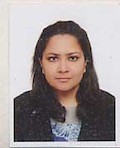
Aastha Dahal
Aastha Dahal is a member of the field research team in Nepal, working in the capacity of Researcher. Over the past two years she has conducted extensive interviews with the members of the security forces, government, civil society, doctors, victims, judges and lawyers to build an understanding of the root causes of improper use of force. Aastha has also carried out many hours of observations in police stations in several districts of Nepal. She is currently working with the Human Rights Protection Facilitators of the Nepal Police and Armed Police Force to design and implement their projects.
Aastha’s previous experience is in the areas of transitional justice and criminal prosecutions. Particularly she has carried out studies on sexual violence inflicted during the armed conflict, rights of prisoners and detainees inside Nepali prisons and detention centres and worked on draft policy and legislations with Government offices and national and international nongovernmental organisations. She has an LLB from Tribhuwan University (Nepal) and a BA (Hons) in Human Rights and Law from Carleton University (Canada).

Rohit Karki
Rohit is a Researcher and Project Coordinator for the project. His specific role relates to assisting in research design, conducting field research, analysing research data, and working closely with Human Rights Protection Facilitators (HRPFs) in designing, planning, implementing, monitoring and evaluation of their projects.
Previously, Rohit worked as an intern for Australian Institute of International Affairs (AIIA), Canberra-Australia and researcher and project coordinator for Transcultural Psychosocial Organization (TPO) on Child Soldier’s reintegration project in Nepal. He holds an MA in Asian Studies from Australian National University (ANU), Canberra, Australia, and has published wide range of international journal articles and book chapters as lead and co-author.

Leave a Reply
You must be logged in to post a comment.